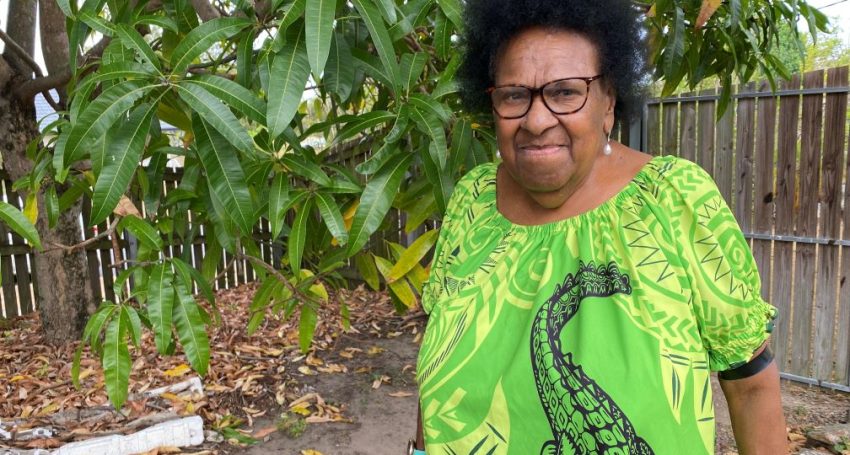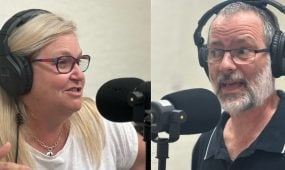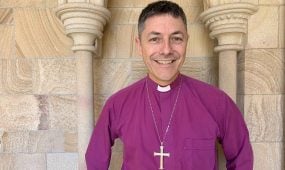My experience navigating the Anglican Church as a Torres Strait Islander person
Resources & Research
“I also often invite other Anglicans to see that Torres Strait Islander Christians are Christians in our own way. We seamlessly blend our ancient sovereign ways and knowledges as Traditional Custodians with the wider Church’s ways and knowledges. For example, as part of my baptism as a baby, my mum removed my clothing and nappy and held me up in the sea breeze to be sprayed, to first be blessed, by the malu (ocean). She then took me to the church for the service,” says Aunty Dr Rose Elu

When I was a teenager living in Seisia in the Northern Peninsula Area Region, I often asked my father and priest older brother about the Coming of The Light — the coming of the Gospel in 1871. I didn’t understand why it was called this — I thought that our people had always been in the light. Their response was, “Yes. That is true. We were always in the light. When the missionaries brought us the light of scripture, the light of the Gospel unified with ours.”
Every year on 1 July, Torres Strait Islander peoples celebrate the Coming of The Light to commemorate the Gospel coming to us and giving us a name for the Creator. The Coming of the Light made this connection, but we had already received God before the arrival of the English missionaries and Melanesian Christian leaders — because God was already with us. It’s important for all Christians to appreciate that Jesus was present in my people before the Bible — before the Gospel — came to the Torres Strait Islands on that special day in 1871. We often say, “God was on both sides of the beach.” As the custodians of the boeradhar (land), malu (sea) and dapar (sky), we had already conceived that there was a Creator God.
However, this is not the message that children’s Bibles published in the English language told me when I was a child. When I was at Sunday School, I remember looking at an illustration of Jesus in a children’s Bible. Jesus was pictured as a man with very fair skin. Sitting on his knees were fair-skinned children, whom he was happily conversing with. At his feet sat a dark-skinned girl who reminded me of me. “Why was Jesus not smiling at and talking with her, also?” I wondered. I felt alienated and excluded by this illustration, rather than welcomed and included.
Advertisement
Sharing stories like these takes a spirit of openness and courage. It also takes openness to be willing to read or listen to such stories, as well as courage to reflect upon them. There are also other stories that take openness to read or listen to and courage to reflect upon, including much more recent ones.
I still sometimes hear stories about First Nations parishioners around the country only being allowed to sing hymns in Language during services if they provide the rest of the congregation with an English translation. This additional work means that they don’t sing hymns in Language as often as they’d like. This is yet another way that the Church is putting stumbling blocks in front of our people, especially young people, who wish to worship.
I have also been present at Anglican gatherings when Aboriginal and Torres Strait Islander cultural protocols were explicitly dismissed by leaders as “unnecessary”. I always speak up and advocate for the importance of cultural protocols when this happens.
I also often invite other Anglicans to see that Torres Strait Islander Christians are Christians in our own way. We seamlessly blend our ancient sovereign ways and knowledges as Traditional Custodians with the wider Church’s ways and knowledges. For example, as part of my baptism as a baby, my mum removed my clothing and nappy and held me up in the sea breeze to be sprayed, to first be blessed, by the malu (ocean). She then took me to the church for the service.
Advertisement
God blesses us through the ocean as the waves and the current go in and out. The ocean is sacred — life-giving — to us. Our spirituality lies in the boeradhar (land), malu (sea) and dapar (sky) and our people have always believed in a Creator. The Christian God is the same Creator God who made us custodians of the boeradhar (land), malu (sea) and dapar (sky).
Churches are important agents of change because Christians care about the whole person, including physical, spiritual, emotional, social and cultural wellbeing. If the Church is going to demonstrate this care, all Anglicans need to come to terms with how “Australia” started, especially because the impacts of colonialism are ongoing for Aboriginal and Torres Strait Islander peoples.
This process is slow. I think Anglican clergy and lay leaders need to be more intentional in their leadership as a result. Some of the many ways they can do this include building relationships with Elders and respecting their unique roles; removing stumbling blocks for Language to be used in services; and, publicly standing up for the observance of cultural protocols and our justice priorities, including care for the climate and truth-telling about our shared histories.
I have witnessed many Anglican clergy and lay leaders be intentional in these ways. For example, Bishop Keith Joseph has served for many years in Melanesia, the Northern Territory and North Queensland, and has vast knowledge of both Melanesian and Aboriginal ways. The Rev’d Dr Rodney Wolff — Priest-in-Charge of Holy Trinity, Fortitude Valley — is supportive of Torres Strait Islander parishioners celebrating the third Sunday of each month with parts of the service and hymns spoken in Language. And Dr Stephen Harrison — Director of Advocacy, Mission, Research and Advocacy for Anglicare Southern Queensland — is a long-term supporter of Aboriginal and Torres Strait Islander peoples’ justice priorities, such as constitutional recognition and truth-telling.
While visionary and intentional leadership is important, all Anglicans need to understand that they have much to learn from Traditional Custodians — about our God-given sovereignty and associated life-giving principles and practices. Other Christians can be part of our ongoing legacy — they, too, can learn to cherish the boeradhar (land), malu (sea) and dapar (sky).
Editor’s note: This reflection is an excerpt from the Anglican Board of Mission’s 2024 Lenten study guide, God’s Own Country. Purchase your PDF or hard copy version online today. Based on the Seven Days of Creation and with stunningly beautiful paintings by The Rev’d Aunty Robyn Davis, God’s Own Country is an essential, life-giving and challenging study.





